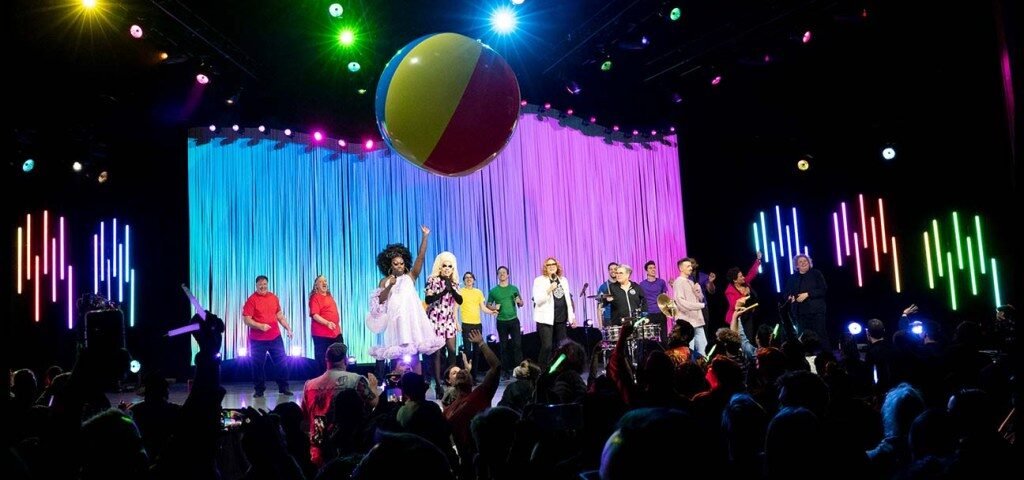


Hollywood Reporter Critics Pick the 10 Best Films of 2024 So Far
June 28, 2024


‘Ultraman: Rising’ Review: A Famous Japanese Franchise Gets a Heartwarming American Reboot
June 29, 2024Lily Tomlin, Margaret Cho, Eddie Izzard and Sandra Bernhard are among those sharing their experiences in Page Hurwitz’s archive-rich study.
Outstanding: A Comedy Revolution
A group hug with laughs and tears.
In the opening section of Outstanding: A Comedy Revolution, you might be forgiven for thinking this is an extended Pride Month promo to breathe new life into Netflix’s 2022 special, Stand Out: An LGBTQ+ Celebration. But in a Q&A following the rousingly received opening-night screening at the Provincetown Film Festival, director Page Hurwitz clarified the chicken-and-the-egg situation, explaining that she produced the event at the Greek Theatre in Los Angeles, which assembled 22 prominent queer comics on the same bill, as a foundational building block for this documentary surveying the rich history of LGBTQ+ comedians.
Even if it only served as a vehicle for the rediscovery of the hilarious Robin Tyler, the first lesbian comic to come out on national television in 1978, the doc would be invaluable. When Tyler and her partner Pat Harrison, who performed as the comedy duo Harrison and Tyler, took on anti-gay crusader Anita Bryant — “I don’t mind them being born again, but do they have to come back as themselves?” Tyler asks — ABC promptly canceled their deal.
Even a comedy titan like Laugh-In veteran Lily Tomlin, despite making no secret of her relationship with her longtime partner and now wife Jane Wagner, says that actually declaring herself a lesbian back then was unthinkable. But the fabulous Norman Seeff shot of Tomlin looking fierce in an “Evolve or Die” muscle T-shirt makes it clear that by the mid-‘80s, she was hiding nothing.
Tomlin is one of several heavy-hitters whose interviews and comedy clips provide insight into both the barriers in place and the subversive ways many comics got around them. Going back to the Black vaudeville circuit of the 1920s with performers like “Moms” Mabley, queerness has long been a factor in stand-up, whether implicit or explicit. Sandra Bernhard, Margaret Cho, Rosie O’Donnell, Wanda Sykes, Marsha Warfield, Eddie Izzard, Hannah Gadsby and Bruce Vilanch are among those weighing in with illuminating commentary.
One of the most moving aspects of the film is how it highlights the mentor-mentee dynamic of queer comedy, with each trailblazer passing on an expanded legacy to the next up-and-comer. Both Bernhard and Cho talk of Tomlin as a major inspiration, while Joel Kim Booster acknowledges that queer women in comedy were his chief influence.
One of the most exhilarating clips has Bernhard appropriating the disco classic “Do You Wanna Funk?” as a rallying cry for sexual freedom, provocatively skewering the stifling conservatism of public figures like Reagan and Jerry Falwell.
Several commentators make the point that unapologetically anti-gay comedy remained widely acceptable through the end of the last century and beyond, whether it was the goofy gay-panic humor of Mel Brooks and Sid Caesar or the outright homophobia of Eddie Murphy’s stand-up specials. The flip side is Richard Pryor’s appearance at a 1977 gay rights fundraiser at the Hollywood Bowl, where he talks frankly about the joys of sex with men before turning on the well-heeled, predominantly white audience for their absence from the Black rights struggle.
Input from Scott Thompson of Canadian comedy group The Kids in the Hall is especially poignant as he talks of having to create characters to hide his sexuality behind. His acerbic bar fixture Buddy Cole was notable as “the first gay character who fucked.” Elsewhere, tacit pressure made it clear that straight audiences could get on board with queer comedy so long as they didn’t have to think about actual gay sex.





